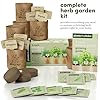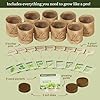zunatu 4x2x1ft(2 Pack) Oval Galvanized Raised Garden Bed,Outdoor Planter Box Metal Patio Kit Planting Bed for Vegetables Flowers and Succulents
$47.99 (as of 16:13 GMT -05:00 - More infoProduct prices and availability are accurate as of the date/time indicated and are subject to change. Any price and availability information displayed on [relevant Amazon Site(s), as applicable] at the time of purchase will apply to the purchase of this product.)Sekcen 2 Pack Tomato Planter Box with Trellis Raised Garden Bed Planter Box Self Watering Cucumber Patio
20% OffImproved Soil Quality
Better Control Over Soil Composition
One of the first things I noticed when I started using raised beds was the incredible control I had over the soil composition. You see, when you’re working with traditional in-ground gardens, you’re kind of at the mercy of whatever dirt you’ve got. But with raised beds, it’s all about customization. I can mix different types of compost, organic matter, and nutrients to create the perfect environment for my plants.
Not only does this lead to healthier plants, but it also makes gardening so much more enjoyable. I love playing mad scientist with my soil—adding worm castings here, a sprinkle of bone meal there. It’s like a recipe, and I’m in control. Plus, the ability to use high-quality soil means my plants are getting the best start possible.
Also, since I can control what goes into my beds, I can ensure there are no unwanted pests or diseases lurking in the soil. It’s all about creating a safe haven for my plants, and it’s made a world of difference in my gardening experience.
Water Retention and Drainage
One thing that can make or break your garden is how well it retains moisture. With raised beds, I’ve found that water retention is a non-issue. The elevated beds are great at trapping moisture while still allowing for good drainage. It’s kind of the best of both worlds.
In my experience, this has led me to worry less about the weather. A good rain or a thorough watering can keep my plants thriving without the risk of them becoming waterlogged. I’ve had friends grumble about their plants drowning after heavy rains, while I relax, knowing my beds are handling it just fine.
Plus, I’ve discovered that because I’m conserving water more effectively, my gardening endeavors are more sustainable. It feels good to know I’m not only helping my plants but also being kind to the environment.
Fewer Weeds
Let’s be honest—any gardener knows the pain of dealing with weeds. They’re pesky, they creep in when you least expect them, and they can just ruin a beautiful garden. Since switching to raised bed gardening, I’ve noticed significantly fewer weeds. Honestly, it feels like I’ve been given a secret weapon in my gardening arsenal.
The design of raised beds makes it hard for weeds to take hold. If any do manage to sneak in, they’re usually pretty easy to pull out. I often joke that now I spend more time enjoying my plants than pulling weeds. And who doesn’t want more time enjoying their garden?
Additionally, I’ve learned that using a good mulch layer on top helps even more with weed suppression. It’s a win-win situation. I get a beautiful garden without all the maintenance and hassle. Seriously—what’s not to love?
Extended Growing Season
Soil Temperature Control
One of the most exciting things about raised bed gardening is how it can extend your growing season. The soil in raised beds tends to warm up faster in the spring. This means I can plant earlier than I could in traditional gardens. Last year, I was enjoying fresh greens while my neighbor was still waiting for the ground to thaw.
This temperature control also plays a role in the fall. By using the raised beds, the soil tends to retain heat longer, so I can enjoy a few more weeks of harvests before the frost hits. I feel like I’m cheating nature, but in a good way!
Plus, this extended growing season allows for a wider variety of crops. I’ve had the joy of experimenting with different plantings throughout the year, finding what grows best in my little raised bed oasis.
Increased Mobility
As someone who adores gardening but isn’t exactly getting any younger, the mobility factor in raised bed gardening is a game changer for me. I can reach all my plants without having to bend over or kneel on the ground. I mean, have you ever tried to wrestle with weeds while standing up? Not fun.
These elevated beds are a blessing for anyone with mobility issues. I can spend hours tending to my plants without that pesky backache that usually follows me around. It’s all about making gardening accessible and enjoyable, and with raised beds, I’ve found the perfect solution.
I’ve also found that I can fit more beds into a smaller space, making my gardening area more efficient and organized. Everything is easily reachable, which means I can spend more time enjoying my plants and less time fussing over logistics.
Better Pest Management
Let’s face it—pests can ruin a garden. But with raised beds, I’ve discovered that managing these unwelcome visitors is often easier. The elevation keeps my plants away from many ground pests. I’ve noticed fewer issues with slugs and other soil dwellers attempting to snatch a snack from my veggies.
Plus, I’ve found that using companion planting becomes much simpler. I’m able to strategically place pest-repelling plants near those that are most vulnerable. It feels like I’m creating little ecosystems within my raised beds, and they work together beautifully!
Another thing I love? The option to cover my beds with netting or protective cloches without hassle, further deterring pests while still allowing light and rain to pour in. It’s all about being proactive, and I’ve had great success with this approach.
Ease of Maintenance
Less Compaction
One of the biggest surprises for me in raised bed gardening has been how much less compaction there is. You know how in traditional gardens, walking on the soil can lead to a hard, crusty mass that just won’t budge? That’s not an issue here, because my beds have sides that keep me and my tools from trampling the soil. It’s a revelation!
With my beds staying fluffy and loose, my plants have room to thrive. This also helps with aeration, drainage, and root growth, which ultimately leads to healthier and more productive plants. I can honestly say I feel good knowing I’m giving my plants the best environment possible.
Now, maintenance feels lighter too. I don’t have to spend time loosening soil or worrying about compaction—what a game-changer that is! More time enjoying my garden and less time maintaining it? Count me in!
Strategic Planting
Raised beds allow for more strategic planting. I’ve learned that I can space out my crops in a way that maximizes light exposure and avoids overcrowding. It’s almost like I’m giving my plants a VIP lifestyle. They have space to breathe and grow without competing too fiercely for resources.
This method also allows me to rotate my crops easily. How cool is that? I can mix things up year after year, keeping my garden healthy and lively. It’s like giving my plants a fresh start every season, and they repay me with beautiful blooms and delicious veggies.
And let’s not forget about aesthetics. A well-planned raised bed can become a stunning visual work of art in your yard. I’ve even had guests compliment my setup, and it feels great to show off my green thumb!
Less Watering
One of the aspects I truly appreciate about raised bed gardening is that it requires less frequent watering. Because of the way that raised beds trap moisture, I find I can go longer between water sessions. Last summer, with the heat cranking up, I was so relieved to see my plants still flourishing without me racing out daily to quench their thirst.
This eco-friendly benefit is a win-win. It not only saves my water bill but also means I’m conserving water in a responsible way. I love knowing that I’m doing my part for the environment while still enjoying a bountiful garden.
Plus, this gives me the freedom to step away for the weekend without worrying if everything will shrivel up and die. The last thing I want on a relaxing getaway is to stress over my garden! I can enjoy being out and about while knowing my plants are happy and healthy!
Conclusion
Overall, raised bed gardening has brought a plethora of benefits to my gardening journey. From enhanced soil quality to easier maintenance, the improvements have made my gardening experience more enjoyable, productive, and sustainable. If you’ve been on the fence about trying it out, I genuinely encourage you to give it a shot. You might just find your new favorite hobby sprouting up!
FAQ
1. What are the main benefits of raised bed gardening?
The main benefits include improved soil quality, extended growing season, easier maintenance, better pest management, and reduced water needs.
2. Can I grow vegetables in raised beds?
Absolutely! Raised beds are ideal for growing various vegetables, herbs, and even flowers. They allow for optimal growth and easy management.
3. How do raised beds help with weed control?
The elevation and controlled soil environment of raised beds significantly reduce weed pressure, making it easier to maintain your garden.
4. Do raised beds require more watering than traditional gardens?
Typically, raised beds require less frequent watering because the soil retains moisture better, making gardening more efficient.
5. Are raised beds difficult to maintain?
Not at all! Raised beds are generally easier to maintain than traditional gardens, as they require less bending, weeding, and tend to stay healthier.
Related Content
- South Pasadena Beautiful | Earth Day DIY Projects Webinar, April 18th
- 48 Veggies You Can Plant In March RIGHT NOW!
- With clock ticking on Dane County landfill, focus turns to reducing food waste
- <b>Composting</b> Equipment Market to Witness an Outstanding Growth During 2021 | Leading Key …
- Milwaukee leaf collection deadline extended to Nov. 21 – TMJ4














































